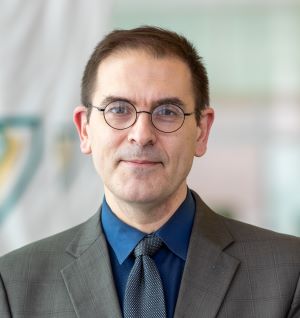Formation of and quick life cycle of new political parties is focus of book by Professor Kevin Deegan-Krause and European colleague

What do rock musicians, the owner of a vodka distillery, investigative journalists, comedians, TV psychiatrists, former monarchs and the host of Lithuanian “Who Wants to be a Millionaire” all have in common?
Probably not a lot, but over the last decade and a half, people such as these have been elected to positions of political power across Europe and the rest of the world as part of a growing trend toward ever newer political parties with leaders claiming to be outside of politics.
Associate Professor Kevin Deegan-Krause of political science teamed up with political scientist Tim Haughton of the University of Birmingham to research this development, with the resulting book, “The New Party Challenge: Cycles of Party Birth and Death in Central Europe and Beyond,” recently published by Oxford University Press.
“Almost 15 years ago we started to look at emerging parties in Europe,” says Deegan-Krause. “At first we saw them merely as an interesting flash in the pan, but when we looked closer we found something more significant: the new parties rarely survived past their first election and other new parties kept coming. Instead of serving as a warning to others, the early deaths of new parties just created opportunities for even newer parties.
“We started to see a cycle: a new party would make a political breakthrough by claiming to want to fix the country’s corruption problems, and then it would prove to be no better than its predecessors and it would weaken and often die. And voters, instead of going back to their original parties, would go to a newer party with fresher faces that was saying all the same stuff about corruption, and the whole thing would happen again. In some countries we’re already in the cycle for the fourth or fifth time.”
Deegan-Krause stressed that these are global trends. “The rapid rise of charismatic individuals with nonpolitical backgrounds, all of that is present in the U.S.,” he says. “It’s just within the parties, not amongst new parties. Factions pop up in our older parties the way new parties pop up in party systems around the world. The same patterns are showing, just in a different way.”
As part of the research, Deegan-Krause visited over 200 political offices across the 11 post-communist countries of Eastern Europe, alongside party offices in Western Europe and countries as far as Iceland.
“The university granted me a perfectly-timed sabbatical which was a huge help, and my colleagues have been incredibly helpful not only with expressions of their support but with active advice and guidance,’ says Deegan-Krause. “I cannot emphasize enough how much I have grown and changed by spending time doing research outside the U.S. To be able to go abroad, immerse yourself in another country, whatever it is you’re studying from politics to epidemiology, to be able to immerse yourself in a culture, and then be able to see your own culture from the outside, there’s no more transformative experience, and no better than knowing who you are and where you are.”
Deegan-Krause’s interest in European politics began in 1989, when he went to then Czechoslovakia to teach English following the fall of the Berlin Wall. The more research he did on the region, the more he became fascinated by political parties, and that’s been one of his key areas of study since 1993.
“One of the interesting things we found was the average age of the parties,” Deegan-Krause says. “In the U.S. our average party age is about 190 years old. In Europe, some countries’ party systems have an average party age of less than 10 years, and some of them are getting even younger. There is a constant cycle of renewal.”
While these emerging parties and charismatic figures are certainly an interesting novelty, Deegan-Krause highlights the deep problems at the heart of this growing trend.
“These parties are born fragile; they’re usually built without much on-the-ground organization and through the internet,” he says. “They focus on single issues and single leaders, sometimes even including the leader’s names in the party, and then when that leader fails, the party dies. I can name maybe five parties out of the hundred we’ve studied that have remained viable past one election cycle.
It’s good to get new blood into the system, but these parties have such short lifespans that it’s hard to organize and get anything done. These parties don’t expect to be around for the long haul, so they can’t build organizations and work on policy and actually accomplish things over the long run. Usually they don’t even try. In an era when we see an ever-greater need for long-term policies, we instead get parties with no attention span.
“There are new political winds blowing that are pushing toward lighter weight, less well-defined political structures that are more focused on celebrity and on fighting corruption, and that is true wherever you go. We need to know what is coming, because we have to figure out ways to build long-term thinking into our political system. Some kind of accountability to the future and future generations. One of those sources used to be political parties, but if they keep going the way they’ve been going, that will be harder and harder to do. We have to build the civic capacity as citizens and as voters to demand longer time-horizons from our political leaders, and that’s true whether its Central Europe or the United States.”
By Jacob Stocking, OIP communications associate
The Office of International Programs leads Wayne State's global engagement by creating opportunities that foster international education and research, facilitate the exchange of individuals and ideas that promote global competencies and citizenship, and provide resources that support the expansion of the university's global agenda. Follow us @WayneOIP.